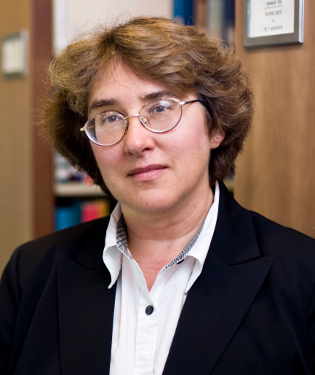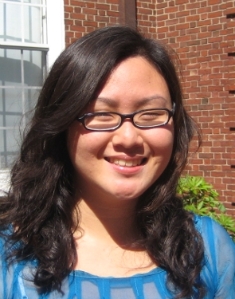Threads of Hope
Researchers aim to improve working conditions, and lives, in factories overseas
By Marjorie Howard
They work in crowded garment factories, many using sewing machines without needle guards, so errant fingers often get jabbed. Others maneuver huge, machine-operated knives, using their bare hands to guide the powerful blades through foot-high bolts of fabric. In many garment factories around the world, workers face poor safety conditions, long hours and low pay—earning around $70 a month. Some 90 percent are women between the ages of 18 and 25 who may be physically or sexually abused at work.

“There seems to be a lot of evidence that the program was able to raise wages and improve working conditions for apparel workers,” Drusilla Brown says. Photo: Alonso Nichols
But under a project called Better Factories Cambodia, most garment factories in Cambodia that have sold products on the international market since 2001 have adhered to management rules established by the International Labour Organization (ILO), a UN agency. The goal, says Drusilla Brown, an associate professor of quantitative economics in the School of Arts and Sciences, is to encourage better treatment of workers without adversely affecting business opportunities.
Brown, who has been studying international trade and labor standards for the last decade, says the program has been successful so far. Based on information collected in the field by Better Factories Cambodia, “there seems to be a lot of evidence that the program was able to raise wages and improve working conditions for apparel workers,” she says. The Better Factories program has expanded to Jordan, and the next destination will be Vietnam.

“Often we see factories put a toe in the water to try a change, and it doesn’t work, and they retreat back to the traditional ways of managing workers,” says Drusilla Brown.
Now Brown and her colleagues are taking a closer look at the Cambodian factories, examining the connection between better working conditions and the productivity of workers and the strength of those businesses. The connection might appear obvious, though that isn’t necessarily the case, Brown says. But if data show the positive outcomes of adhering to the ILO rules, other factory owners might be more likely to embrace the regulations, the researchers theorize.
Joining Brown in studying and writing about these labor-management issues are faculty and students from the School of Arts and Sciences and the School of Medicine, some of whom have traveled to Southeast Asia to observe working conditions firsthand. Along with colleagues from Macalester College in Minnesota, they will be analyzing how factory managers adopt new labor and occupational health practices and examining how improved working conditions affect education, gender equality and health.
While verbal and even physical abuse may occur in some factories, other workplaces may simply demand workers put in long hours for little pay. “We think about a spectrum of behaviors,” says Brown. “It’s not that one is a sweatshop and another isn’t.” Part of the research will help clarify what kinds of factories are clustered at different parts of the spectrum and why—it could be the kinds of products they make or the customers they’re serving.
There are other issues to consider as well. For example, in one group of factories, compensation isn’t based on individual productivity but on what is produced by a whole line of workers. The arrangement could give workers an incentive to teach each other, to catch mistakes and to make suggestions, Brown says, and if the system results in productivity gains, it might be replicated by other factory owners.
Digging through Data

“I love economics, and I’m comfortable working with numbers,” says Debra Ang, A10.
Enter Debra Ang, A10, who is majoring in quantitative economics and international relations. As the Kokulis Family Summer Scholar, she’s supported by an endowment created by George C. Kokulis, A82, A11P, and his brother, John L. Kokulis, E81. Ang is working with Brown to analyze information collected by the Better Factories Cambodia staff—from factory visits and surveys—to understand better how the ILO rules are working in practice.
The data Ang is poring over is not exactly clear cut. “She’s working with primary data, and it doesn’t come all nice and pre-packaged, as it does in a statistics class,” says Brown. Instead, Ang has to assemble the data and sort out myriad discrepancies. For example, a factory may have more than one name. In Cambodia, factories operate tax-free during their first five years in business, so they often close after five years and then reopen under a new name to retain the tax advantage. Ang also has had to contend with numerous typos in the reports and surveys, so that a computer search for a particular name or term might not produce the correct result.
None of this fazes Ang. “I love economics, and I’m comfortable working with numbers and being organized,” she says. “Bringing all that together was what I wanted to do. I’m getting my hands dirty.”
It’s important to find out how difficult it is for factories to make the transition to offering better working conditions. “We want to see if factories try things and then stop,” Brown says. “Often we see factory owners put a toe in the water to try a change, and it doesn’t work, and they retreat back to the traditional ways of managing workers.”
Brown and her colleagues also want to compare factories that are “trying and persisting and succeeding with others that are trying and retreating and being scared,” she adds. “If that happens, we’ll have evidence that what’s holding factories back is making the transition” to the better working conditions under the ILO rules. The hope, Brown says, is that factory owners will embrace the more sophisticated labor management techniques.
Findings from the research will be made available to Better Factories Cambodia and will be published in scholarly journals. They will also be given to perhaps the most important audience: Cambodian factory owners.
Ang, who Brown proudly points out has the highest grade-point average in the economics department, plans to continue working on the factory project for her senior thesis. A native of Singapore, she found a way to fold her research into a summer visit to her mother, planning to take a trip to Cambodia with her parents for a weekend. Before going, she said she hoped the brief trip would give her a sense of the country. “I just want to get a feel for the place,” she says.
Marjorie Howard can be reached at marjorie.howard@tufts.edu.


